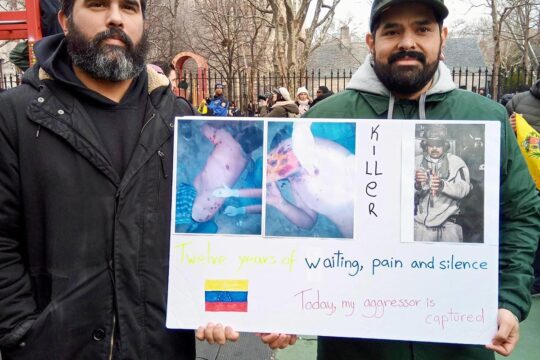Osama Krayem, on trial for the murder of a Jordanian pilot burned alive in Syria by the Islamic State (IS) group, on Wednesday refused to answer questions from the prosecution.
The brutal killing took place sometime in late 2014 or early 2015 and sparked outrage internationally and in Jordan, which was participating in the US-led coalition's strikes against IS positions in Syria.
Krayem, a 32-year-old Swede already serving long prison sentences for his role in the Paris and Brussels attacks in 2015 and 2016, is on trial in Stockholm suspected of war crimes and terrorist crimes for his role in the pilot's killing.
On December 24, 2014, an aircraft belonging to the Royal Jordanian Air Force crashed in Syria.
The pilot, Maaz al-Kassasbeh, was captured the same day by IS fighters near the central city of Raqqa and was burned alive in a cage sometime before February 3, 2015, when a video of the gruesome killing was published, according to the prosecution.
On Wednesday, prosecutor Henrik Olin asked Krayem, who was dressed in a dark blue shirt and appeared unfazed, if he intended to answer any questions.
"Can you say something about your current situation? Are you a practising Muslim? Can you say something about your view of the Islamic State?" the prosecutor asked.
"Does the fact that you are no longer answering questions have anything to do with you feeling that you were mistreated during the Swedish investigation?" Olin added.
Avoiding the prosecutor's gaze, the defendant remained silent.
Segments from interrogations with Krayem conducted during the investigation were read out and played during the trial.
When questioned by police, Krayem insisted he had spent only 15 to 20 minutes on-site, unaware of what was going to happen, according to the preliminary investigation.
"I was terrified, it was the first time I had seen someone burn," he said at the time.
- Brother on the stand -
Earlier on Wednesday, Jawdat al-Kassasbeh, the brother of the pilot and a plaintiff in the case, told the court of the physical and psychological trauma the family has suffered since the killing.
He said he learned of his brother's capture through a relative who worked at Jordan's foreign ministry and immediately went to the air force headquarters.
"There, I see that the head of the air force and the operations teams are having a meeting on the subject... There were large screens showing images of Syria," he testified.
"He told me: 'I think he's in this house,'" he said.
"Psychologically, I was not doing well at that moment. So I told the head of the air force that ... I thought (IS fighters) would kill him in a horrible way. I asked if it would be possible to bomb the house so he could be spared an atrocious death," he added.
The Swedish investigation describes the al-Kassasbeh family as having close ties to Jordan's royal family and military.
Jawdat al-Kassasbeh said he later learned of his brother's death on television.
"It was a shock. I watched the whole video but in bits. I couldn't watch the entire video until 2021," he said.
When his mother learned of the execution, "she had to be hospitalised immediately".
His eldest sister "developed diabetes", while their father "contracted chronic illnesses, hypertension and is in poor psychological condition, he cries regularly", al-Kassasbeh said.


